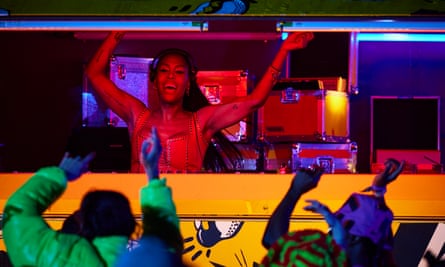‘Clubbing just isn’t cool’: UK’s New Year’s Eve revellers switch to warehouse or home parties | Clubbing – MyCyberBase
Welsh dance duo Overmono have had about as good a year as an underground rave act could hope for. There were sold-out headline shows, a debut album in the charts, a busy festival season playing peak slots, and to top it all off, three shows over the new year period. So where can you catch one of the hottest tickets in the UK dance-music market right now? Australia.
It’s not just Overmono. Many big artists are gigging abroad this new year. It used to be that every UK club would have an end-of-year party. DJs would play two or three shows on the night.
“They’d maybe do an early set in Glasgow then drive through to Edinburgh, or on to Manchester,” says Scottish promoter Nick Checketts, 27. But this year, a lot of smaller promoters are trying to avoid New Year’s Eve, and some clubs are closed altogether. “I would 100% do it if I was confident we could attract a crowd and be busy, but it’s too tough.”
Steven Braines, co-founder of club night He. She. They., is sitting this one out too. “The habits of people going out on New Year’s Eve have really changed. House parties are back, or people are looking for that big moment and to be part of a wider experience. Clubs are suffering.”

Indeed, one of the most significant end-of-year parties will be a 24-hour livestream pre-recorded rave in a packed Brooklyn warehouse featuring star DJs Peggy Gou, Kaytranada and Honey Dijon – released on Apple Music. The live events that have sold out in advance are enormous: 12,500 tickets at Wembley arena for Defected Records, 10,000 at Warehouse Project in Manchester. The mid-level club night is being decimated, and industry insiders say club culture is over.
“Ticket prices have risen, and young people are tending to save their money and invest in those big moments. That’s really eating away at the core audience of the smaller-capacity clubs,” says Finlay Johnson from the Association for Electronic Music. He says many big UK acts have headed out of the country to Australia, Dubai or Europe in search of end-of-year shows. Others won’t be gigging.

This, says Sacha Lord, night-time economy adviser for Greater Manchester and co-founder of Warehouse Project, is a sign of what’s to come next year. “Your typical high-street nightclub, the old carpeted ones, is rapidly dying away,” he says. “We will see many big chain closures over the next 12 months. I know there are problems.”
In the last year, 125 venues have been forced to close due to the cost of living crisis, and Kelly Wood, national organiser for live performance at the Musicians’ Union, says the recent closure of cherished venue Moles, in Bath, is a “stark warning”.
Social media is a major factor. According to the night index report from Rekom UK, released this month, almost a quarter of punters look to TikTok to help choose a night out. “The big events look great on social media and are a lot more fun. When you see a room full of people in a warehouse setting with big production versus a clip of 50 blokes loitering in a small club, which translates better as a moment? People want to be a part of this with their friends. They want to experience the moment they’ve seen online,” says William Aspden, head of A&R at XL recordings and manager of Overmono.
Festivals are also taking tickets out of the market for smaller clubs. The festival season this year was “phenomenal”, says Michael Kill, chief executive of the Night Time Industries Association, who thinks these big events – where you get to see a raft of artists in one night – are an extension of that. “They create a festival environment in a venue space regardless of the weather,” he says.
after newsletter promotion
The preference for big nights does not come cheap. At Wembley, first-release tickets started at £52; for VIP packages it was £104. At the Warehouse Project, tickets were £45 or more. Transport costs are rising too, with taxi firms on the cusp of being obliged to charge VAT on top of fares. “If a £10 journey becomes £12, it’s starting to get to a point where, through taxation, we’re creating a financially inaccessible environment for people who are already under pressure,” says Kill.
What’s more, late-night venues are struggling to draw a young crowd, particularly with a fifth of under-25s choosing not to drink alcohol at all.
The pandemic also changed habits, and there is now a cohort of young people who would rather stay in. “Instead of having club experiences, it was online, and people got used to livestreaming at home,” says Paul Rose, DJ and host of the Not A Diving Podcast. Even top up-and-coming artists, such as Yunè Pinku, say they do not enjoy the club environment – Hunger Magazine has branded them “ravers who hate to rave”.
So is this the beginning of the end for nightclubs? Perhaps so. “Clubbing just isn’t cool any more,” says Rose. “These things don’t last for ever. Small clubs with good music are just not the place to be.”
, 2023-12-31 15:14:19 ,
#Clubbing #isnt #cool #UKs #Years #Eve #revellers #switch #warehouse #home #parties #Clubbing
for more interesting Article Visit regularly : https://mycyberbase.com/





